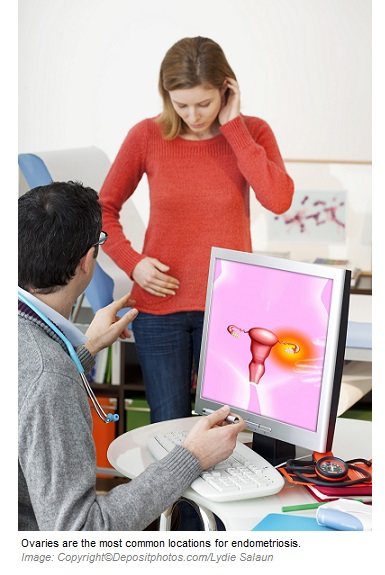 the uterus. The most common locations for endometriosis are ovaries followed by other organs in pelvis. It could occur in the bladder, intestines, lungs, kidneys and even brain.
the uterus. The most common locations for endometriosis are ovaries followed by other organs in pelvis. It could occur in the bladder, intestines, lungs, kidneys and even brain.
Affecting about 10 – 15 % of women between 20 and 44 years old, endometriosis is almost seen during reproductive ages, and rarely seen after menopause. It could be totally without any symptoms. However, pelvic pain and infertility are the main symptoms. Majority of patients complain of a constant pain in pelvis or lower sacrum. There is often a painful intercourse as well.
The exact cause is unclear. Among experts, the possible causes are:
- Retrograde menstruation (Sampson’s implantation theory).
- Spreading of endometrial tissue via blood or lymphatic system (Halban`s theory).
- Coelomic metaplasia (Meyer’s theory).
- Dysbiosis (imbalance in normal flora).
- Compromised immune system.
- Hormonal imbalances.
- Genetics.
- Environmental factors.
Possible risk factors are:
- Early menarche.
- Regular periods with shorter cycles, longer duration, or heavier flow.
- Endometriosis in first degree relatives.
- Sever dysmenorrhea.
Nutritional Supports:
Restricted Foods:
- Sugars. They weaken the immune system.
- Saturated fats.
- Trans-fats. They may increase risk of endometriosis.
- Fried foods.
- Processed foods.
- Alcohol.
- Caffeine.
- Dairy products.
- Nonorganic red meat.
- Foods high in Omega-6 fatty acid: safflower oil, sunflower oil, sesame oil, grape seed oil, beef, avocado, corn, and egg yolk.
Recommended Foods:
- Drink plenty of water: at least 2 liters a day.
- Whole grains.
- Foods high in fiber: lentils and beans.
- Foods high in Omega-3: fish, flaxseed, hemp seed, chia seed, and walnuts.
- Fresh vegetables.
- Flaxseeds.
- Foods high in indole-3-carbinol: broccoli, cauliflower, Brussels sprouts, cabbage, kale and collard greens. Indole-3-carbinol helps the liver detoxify excess estrogen.
- Foods high in flavonoids: berries and red grapes.
- Garlic and onions.
- Basil.
- Peppermint.
- Ginger.
- Evening primrose oil.
- Dandelion greens.
- Beets.
- Soy foods.
Recommended Supplements:
- French Maritime Pine Bark Extract: 100 – 200 mg a day. It reduces the symptoms of endometriosis.
- Grape Seed Extract: 50 – 100 mg a day.
- Indole – 3 – Carbinol: 300 – 600 mg a day.
- Omega – 3 Fatty Acids: 2 – 3 grams a day.
- Vitex (Chasteberry): 180 – 240 mg a day. It balances out the ratio between estrogen and progesterone.
- D – Glucarate: 500 – 1000 mg a day. This product helps the liver detoxify and excrete excess hormones by blocking the enzyme B-glucuronidase.
- DIM (Di Indole Methane): 100 – 200 mg a day. It assists the liver in estrogen breakdown.
- Vitamin E: 800 IU a day.
- Vitamin C: 4 – 6 grams a day.
- Choline (Vitamin B18): 500 – 1000 mg a day. This lipotropic supplement supports function of the liver in removing fats and detoxifying toxins.
- Methionine: 1000 – 1500 mg a day. This essential amino acid helps the liver to process and eliminate fats.
- Vitamin B – Complex: A high potency product.
- Digestive Enzymes: A full spectrum product.
- Probiotics: a product that provides minimum 5 to 10 billion active organisms per serving.
Miscellaneous Suggestions:
- Liver detoxification.
- Colon cleansing.
- Acupuncture.

